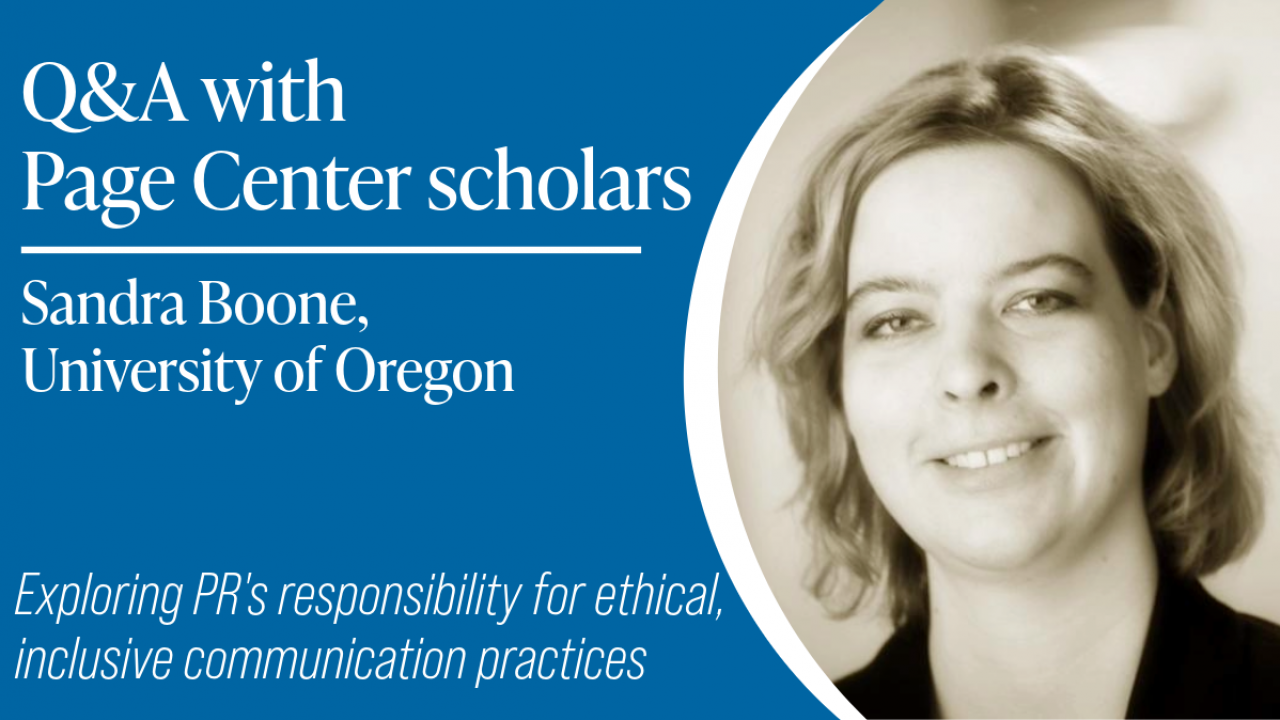September 30, 2024
Finding the public’s voice at the center of public relations – Scholar Q&A with Sandra Boone

Addressing the disconnect between practitioner strategies and academic research – specifically, making the public's voice more central to how public relations operates – is the focus of a Page Center-funded project by two scholars from the University of Oregon. Three-time Center scholar Dean Mundy and third-year Ph.D. student Sandra Boone hope to provide tangible takeaways for public relations companies and classrooms that emphasize accessibility and ethical connections with stakeholders. Their project is part of the Page Center’s 2024 research call on expanding theory for integrity in public communication. In this Q&A, Boone, a first-time Page Center scholar, discusses how diversity, equity and inclusion relate to the responsibilities of practitioners; how the project’s theoretical framework can help shape practical application; and how a focus on “hard skills” can ensure communicators are respectful of the communities they are trying to reach.
DEI is an important and very timely topic in the public relations industry. Companies seem to be making decisions right now on their approach. Has this recent discussion inspired your interest in this topic?
I worked for 15 years as a professional communicator, most recently in higher education but also non-profit and political settings. All of my research is coming directly from questions that I had while I was working, and honestly, some frustrations I had with the field. It was a feeling that I and other practitioners needed a deeper understanding of our responsibility. We're putting messages into the world. We need to truly feel responsible for what that means. Even as the dialogue shifts around DEI, I think it continues to be important no matter what.
Responsibility is a major theme for the Page Center. What does it mean in your work?
For this research, we are looking specifically at the hard skills that practitioners use. In particular, we are looking at language selection and questions of inclusive language, but then also things like ethical storytelling and responsible photography use. So, it's the communications that practitioners put out and wanting to make sure that they're respectful to the people involved. That could be the interviewee you're talking to or the communities you’re trying to reach.
Your project is part of our expanding theory call, but there are also some practical uses. Can you explain some of those?
The public is increasingly demanding that organizations take positions on issues. In a way, that's different than in the past because it includes issues that the entire public doesn’t necessarily agree with. That's where I feel like the role of the public relations practitioner is important in helping leadership think through all the potential ramifications of making a statement. A practitioner can say, “Let's take a step back and make sure we're putting out statements that we can stand by. We shouldn’t rush out a statement because it sounds good.” I tie that to the idea of the practitioner serving as an ethical conscience for the organization, which is a great connection to the Page Center. It’s integrity. It’s responsibility. I strongly believe that the practitioner should feel a responsibility to step in and say, “I actually feel this is unethical for us to do this.”
What is your research plan?
We're doing three focus groups. The first one will be PR faculty, and then two focus groups with students. We want to ask about what PR students are hoping to learn and what PR faculty are teaching now. Then we will do a follow up survey asking questions about the hard skills communicators use – like language and accessibility. We want to bring in some of these areas that are less researched in terms of the actual application of PR principles to the work done by practitioners.
Based on early observations, do you have any expectations for what this study might find?
For the theory side, we definitely want to figure out how to make an argument of making the public's voice a more central PR function. We are trying to think of how to shift PR from solely being a management function to instead saying, “What responsibility do we have to the public?” That is something that could possibly come up. The situational theory of publics is something that we really feel is ripe for revisiting, along with agenda setting theory. Can we say that the public, more than anything, now gets to set the agenda?
We are hoping to work on practical takeaways for students and for classrooms. I think that questions of equity, inclusion and access really need to be central to the PR work and I think that's central to how PR students should be taught to think about the role.
What does making equity, inclusion and access central to PR work look like?
PR professionals should feel that we aren't doing our job if it's not accessible. We can’t say, “We built a website, now we need to make it accessible.” And then say, “Oh, wait, I can't really get that done by launch, so that'll come later.” That just goes against the core idea of PR being about relationship building. It’s deciding that that relationship isn't important.
What was the Page Center’s role in supporting your research and making this project happen?
This is a conversation I've always wanted to have. Going back to my time as a practitioner, I would sit at my desk and ask: “How do I know what to write here? How do I know this picture if good?” I expected to find this research, and I was surprised when I couldn’t find it. I feel like there’s plenty of conversations happening in the practitioner community about these issues. Honestly, too many. So, it’s a place where I feel like academia needs to catch up. So, when I saw this Page Center proposal call, I was excited about the opportunity.
